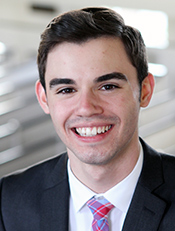Wabash’s newest Rhodes Scholar took to the pages of The Bachelor today to reflect on the process and winning the great academic honor. Here is his column written to and for his fellow students.
Jacob Burnett ’15 – I know you are tired of reading my name and hearing about this scholarship. However, I just wanted to take some time to express my perspective on this event. So, if you read anything about me in relation to the Rhodes, please choose this one; the words are mine and mine alone.
Firstly, the scholarship isn’t about Oxford or the 15 minutes of fame that stem from it. It’s not about the College or even about me. The Rhodes Scholarship allows certain students the opportunity to develop skills that teach us to fight for others: the students that never had a chance, the exhausted mother or father who needs support, the condemned, those simply struggling, and the forgotten. It doesn’t even have to be about changing the world; it does have to focus on how we, as the privileged, will help change at least one person’s world.
 Many Rhodes Scholars take the noble path of becoming professors: educating young men and women to become more than egocentric individuals – to care about the world around them. The individuals that I will come to serve will not necessarily place value on the fact that I was named a Rhodes Scholar; they will value the time and the energy I will invest into them and their lives – something too few of us forget to do in this busy world.
Many Rhodes Scholars take the noble path of becoming professors: educating young men and women to become more than egocentric individuals – to care about the world around them. The individuals that I will come to serve will not necessarily place value on the fact that I was named a Rhodes Scholar; they will value the time and the energy I will invest into them and their lives – something too few of us forget to do in this busy world.
Secondly, something no one informs you about before you receive this or any other life-changing scholarship is the complex amount of emotions that culminate inside your soul. Everyone expects pure happiness, which is part of the equation, but it is not the sole emotion. I sat in a conference room with 12 remarkable students; each finalist equally deserved and earned this recognition. I had the pleasure of learning many of their stories and their goals. The Rhodes Scholarship selection committee on the evening of November 22nd had one of the most difficult jobs in this country: choosing two students whose lives will never be the same. After the chairwoman of the committee said my name, I was aghast and utterly speechless – you feel every emotion at once. You are stunned.
After reflecting on this entire process, I felt a profound sense of guilt that has followed me since that Saturday. Not the type of guilt riddled with connotations of negativity, but guilt that intimately connects with questions of “why.” It also comes with a special burden – now, if I fail in any sense, I’m the Rhodes Scholar that didn’t live up to the name. I don’t mean to complain in any way about this honor; I am overwhelmingly happy. It’s just not as simple as boiling the feeling down to elation. I had a whole Costco-sized humble pie. It reminded me to keep my head in the clouds but my feet on the ground.
Lastly, I want to make something very clear: if Wabash hopes to have more fellowship recipients, it must do more. I fundamentally believe that no college or university can make someone into a fellowship scholar of any kind. However, it can provide opportunities for students who have the necessary interests, skills, and passion to develop into the person who wants to fight the world’s fight. It’s an orientation of the spirit. Wabash needs more opportunities and funding for students to engage in research, ensuring that the Graduate Fellowship Advisor position becomes permanent, alternative spring break opportunities, meaningful and sincere volunteer work, and most importantly, Wabash needs to flex and attract academic muscles. These are not meant to be criticisms, rather, they are observations.
People want to congratulate me on this accomplishment, but it wouldn’t have been possible without the help of Susan Albrecht, Dr. Morillo, and all eight individuals who wrote me letters of recommendation: Dr. Jennifer Abbott, Dr. Michael Burch, Dr. Ethan Hollander, Dr. Robert Horton, Scott Himsel J.D., Arthur Ago J.D., Julia Leist, and Gina Paniagua. I am grateful for all the teachers (both in the classroom and out of it) and friends who never gave up on me. I’d like to thank alumni who have allowed me to intern with them as well as the generous donors who have funded many of my experiences at Wabash.
Finally, I will be forever indebted to my mother, Rita Burnett. A woman who has taught me more about compassion, love, strength, and courage than any person I have met; she is relentlessly noble. She loved me into being. This is our award.
I do not believe that the Rhodes Scholarship makes me special in any way or a better person than I was before the announcement. It allows me a chance to become a well-equipped warrior.